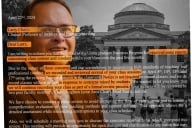You have /5 articles left.
Sign up for a free account or log in.
Over the past five years, more than 1,000 San José-Evergreen Community College District students completed the requirements for a certificate or an associate degree but, for whatever reason, never claimed their credentials. Now, the institutional researcher who recently identified these students wants to track them all down and retroactively award them credentials.
The project at this California community college district goes a step beyond the Institute for Higher Education Policy’s Project Win-Win — a grant-funded, multi-state effort that aims to identify those who have earned but not claimed associate degrees and retroactively award them — in that it also aims to retroactively award certificates. And former students are not the only targets of the district’s efforts. Current students who may have unknowingly earned a certificate on their way to an associate degree are also being sought out.
Oleg Bespalov, the district’s executive director of research and institutional effectiveness, said he got the idea to do a comprehensive degree audit after he ran some numbers to determine his district's effectiveness in helping students meet their academic goals. He discovered that, as a ratio, the district graduates about six credentialed students (counting both degrees and certificates) annually for every 100 full-time equivalent students it has enrolled. He also cited a recent statewide study finding that only 27 percent of community college students who go on transfer to a California State University have an associate degree.
“That struck me as kind of funky,” Bespalov said. “Students are required to complete at least 60 credits before transferring to a CSU, so they cannot all have not earned an associate degree. Clearly, there’s something wrong here.”
Many of those transfer students will ultimately not earn a baccalaureate degree from their four-year institutions, Bespalov noted, meaning that they will then leave the education system without a credential at all. He said a benchmark degree, such as an associate degree, on the way to something greater can make a difference in a person's income level and job opportunities.
So, after a failed attempt to find appropriate degree audit software, Bespalov spent a weekend coding a program to identify these lost credentials and the students who had yet to claim them. After inputting all of the credential-completing variables and a list of five years’ worth of students’ course completion data, he arrived at a number: 1,000 students had passed up credentials. Nearly half the credentials in question were associate degrees; the remainder were certificates.
Still, Bespalov was cautious before revealing this figure to district administrators.
“I didn’t want to scare them,” Bespalov said. “A big number like that can scare some people, especially when you consider the process of what it takes to get those students credentials. And I understand because there’s so much focus on completion right now.”
To make the figure a bit more manageable and prove to district administrators the worth of the project, Bespalov is piloting a program aimed at awarding certificates to the 100 current students at Evergreen Valley College who have already earned one unknowingly. He hopes that these current students will be able to use a certificate to work their way into a better job or earn a higher salary while working toward their degree. Evergreen Valley officials are informing the 100 current students of the certificates they have earned via e-mail and encouraging each of them to see an academic counselor in person to fill out the appropriate paperwork to claim his or her certificate. As the project was only begun recently, Bespalov could not yet share a response rate.
Rita Cepeda, chancellor of the San José-Evergreen Community College District, said she now talks about Bespalov’s degree-audit project, and its identification of what she calls “low-hanging fruit,” as one of the ways in which her district is trying to meet the 2020 completion goals from the Obama administration and the Community College League of California.
“This is not just a PR stunt,” Cepeda said. “We see this as the opportunity to reward students who have already earned degrees. Also, for those who are one or two courses shy, by encouraging them to complete we are maximizing the resources of the state.”
Still, community college administrators have long argued that their institutions lose out in measurements of graduation/completion rates because many of their students complete a credential elsewhere, sometimes at four-year institutions. This kind of retroactive credential awarding would raise completion rates in ways that could help the image of community colleges, better portraying the kind of training and preparation they provide students.
Marilyn Brock, interim president of Evergreen Valley College, concurred, adding that the effort to retroactively award degrees is not necessarily the result of the recent push from national leaders to increase community college completion rates. Perhaps a greater factor, she said, is that the technology to track students is more powerful and useful now than it was, say, a decade ago; such an effort “would have been much more labor intensive” and “required a lot more staff” even then. (Bespalov is currently the only institutional researcher in the two-college district.)
Still, Brock admitted that there will be those students who do not want the credential they might have earned. For example, she noted that some financial aid awards view sub-associate’s certificates as the “endpoint,” meaning that once a student has earned one, he or she is no longer eligible for further aid.
Bespalov also noted that his effort may reach some individuals who don't need the credentials, either because they went on to earn a higher credential or because they feel financially secure. Still, he defended the effort to find those students who may benefit from a credential, and encouraged more community colleges to do the same.
“If you can find one student who came to college and left without a credential and give them one and help them get a better job, that’s life-changing,” said Bespalov, arguing that his effort is aimed at more than just bumping up his district’s completion rates. “It’s never the wrong time to do the right thing.”
Cliff Adelman, senior associate at IHEP, said much more work goes into a thorough degree audit than meets the eye. He added that some of the institutions in the initial pilot cohort of Project Win-Win started with software "that purported to do degree audits, gave up, and went to hand-and-eye" readings of transcript records due to complications identifying, among other variables, residency requirements, degree program idiosyncrasies, the age of credits, and the difference between courses accepted for credit and transfer courses that count toward a credential.
"Most folks think degrees just happen," Adelman wrote via e-mail. "They don't, and, with a highly nomadic student population, the degree audit is the anvil on which success or failure turns."








